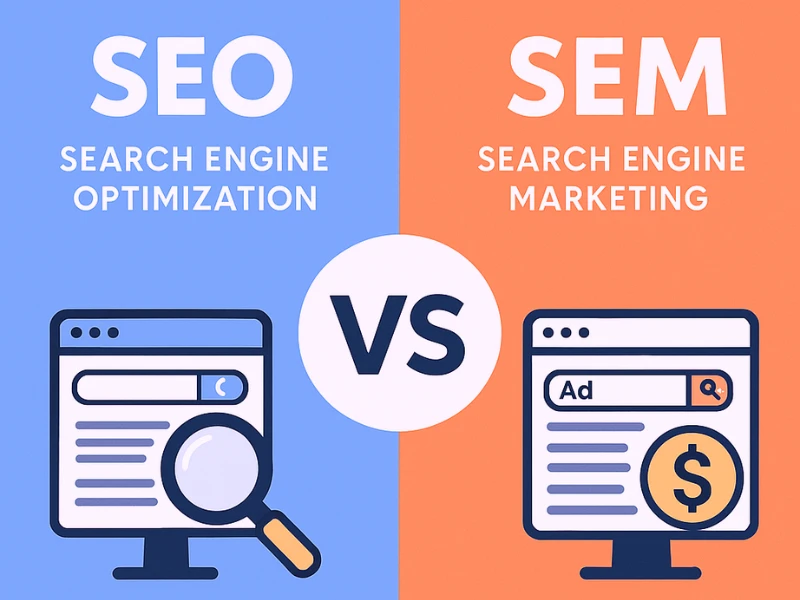
Every business needs attention, visibility, and, ultimately, revenue. SEO and SEM are two distinct techniques that can help you with that.
However, to use them effectively it’s important that you understand search engine optimization vs search engine marketing.
SEO helps to bring customers organically but in a span of 3-6 months. While SEM employs paid efforts that bring results quickly. For businesses to succeed it’s important that they employ them both.
This blog will elaborate on the difference between search engine optimization and search engine marketing along with their key elements and applications.
Search Engine Optimization (SEO) refines websites to elevate their organic rankings on search engines like Google and Bing. Unlike SEM, SEO does not involve direct paid promotions. Instead, it focuses on aligning with search engine algorithms to enhance discoverability naturally and sustainably.
To understand search engine optimization vs search engine marketing, it is imperative that you first look at the core components of SEO.
A well-optimized website enjoys consistent traffic, enhanced brand credibility, and long-term sustainability. According to Backlinko, the first result on Google captures nearly 31.7% of all clicks. This underscores the immense power of SEO, right?
Now to understand the difference between search engine optimization and search engine marketing let us move on to SEM.
Search Engine Marketing (SEM) encompasses paid advertising efforts that propel businesses to immediate prominence on search engine results pages. Unlike SEO, which relies on organic methodologies, SEM leverages Pay-Per-Click (PPC) advertising to drive targeted traffic.
If you’re searching for the question, “What is the difference between sem and seo”, then you must first understand the key elements of SEM.
The instant impact of SEM makes it incredibly alluring. Google Ads data reveals that businesses earn an average of $2 for every $1 spent on PPC ads.
To understand the difference between search engine optimization and search engine marketing a table will help you with it. The below table makes a quick comparison.
| Feature | SEO (Search Engine Optimization) | SEM (Search Engine Marketing) |
| Cost | No direct cost, but it demands time and effort | Paid advertising requires a budget |
| Speed | Takes months to yield significant results | Delivers immediate, high-impact visibility |
| Sustainability | Long-term growth with consistent effort | Short-lived; visibility ceases once ads stop |
| Click-Through Rate (CTR) | Higher for organic results | May be lower due to ad blindness |
| Credibility | Builds deep-rooted trust and authority | Perceived as advertisements, often less trusted |
| Flexibility | Limited control over algorithmic changes | Allows instant adjustments to campaigns |
Many businesses struggle to decide between seo vs sem marketing. In truth, most successful brands embrace both. Here’s why:
In essence, when it comes to search engine optimization vs search engine marketing, both will help your brand in unique ways.
Imagine a newly launched online fitness coaching platform. If they rely solely on SEO, they may remain invisible for months before appearing on Google’s first page. Meanwhile, competitors running Google Ads will effortlessly capture potential customers.
That’s why it’s important to understand what is the difference between search engine optimization and search engine marketing.
By investing in PPC ads, this platform attracts immediate traffic while gradually fine-tuning its website’s SEO. Over time, as SEO strengthens, dependence on paid ads diminishes, significantly reducing costs while maintaining a robust online presence.
The digital marketing landscape never stands still. As search engines evolve, so must SEO and SEM strategies. While knowing search engine marketing vs search engine optimization, you must also understand where they’re headed:
With the search engine optimization vs search engine marketing debate, you must understand that SEO and SEM are not adversaries.
While SEO cultivates sustainable, cost-effective visibility, SEM guarantees immediate, highly targeted results.
Businesses that master both will confidently navigate the competitive digital landscape, securing steady traffic, conversions, and unrivaled growth in an ever-evolving online world.